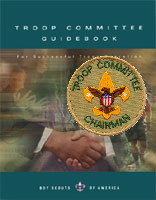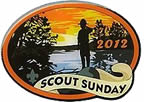 At a recent troop meeting we were welcoming a parent of a boy new to Scouting and discussing how the troop and Boy Scouts all works, and in the process of explaining which committee member takes care of dues, or membership, he asked me what my position was, and what I do in the troop.
At a recent troop meeting we were welcoming a parent of a boy new to Scouting and discussing how the troop and Boy Scouts all works, and in the process of explaining which committee member takes care of dues, or membership, he asked me what my position was, and what I do in the troop.
This kind of took me aback, because most people in Scouting are familiar with the committee chair’s role, or at least knows what functions he or she performs. I blurted out “well, I’m kind of like the CEO of the troop,” and while I felt at the time that it was an OK answer, later I thought that it didn’t really describe what the committee chair does. Continue reading ““So, what is it that you do?””


 The Scouting movement is unique among non-faith-based youth groups in that it recognizes and expects a belief and duty to a higher power of its members. It’s part of rank achievements in Cub Scouts, one of the points of the Boy Scout Law, and the first obligation in the Scout Oath and Venturing Oath.
The Scouting movement is unique among non-faith-based youth groups in that it recognizes and expects a belief and duty to a higher power of its members. It’s part of rank achievements in Cub Scouts, one of the points of the Boy Scout Law, and the first obligation in the Scout Oath and Venturing Oath.
 As the calendar clicks over another year, many of us take time to look back at where we’ve been in the last twelve months and look ahead to the next twelve. It’s also a good time to assess what your troop or pack has accomplished, how it’s benefited the boys in your unit, and what changes you can make or actions you can take to improve things.
As the calendar clicks over another year, many of us take time to look back at where we’ve been in the last twelve months and look ahead to the next twelve. It’s also a good time to assess what your troop or pack has accomplished, how it’s benefited the boys in your unit, and what changes you can make or actions you can take to improve things.  As a Scouter, one of the most important things you can do to improve not only your experience in Scouting but also to improve the program for the boys is training.
As a Scouter, one of the most important things you can do to improve not only your experience in Scouting but also to improve the program for the boys is training.